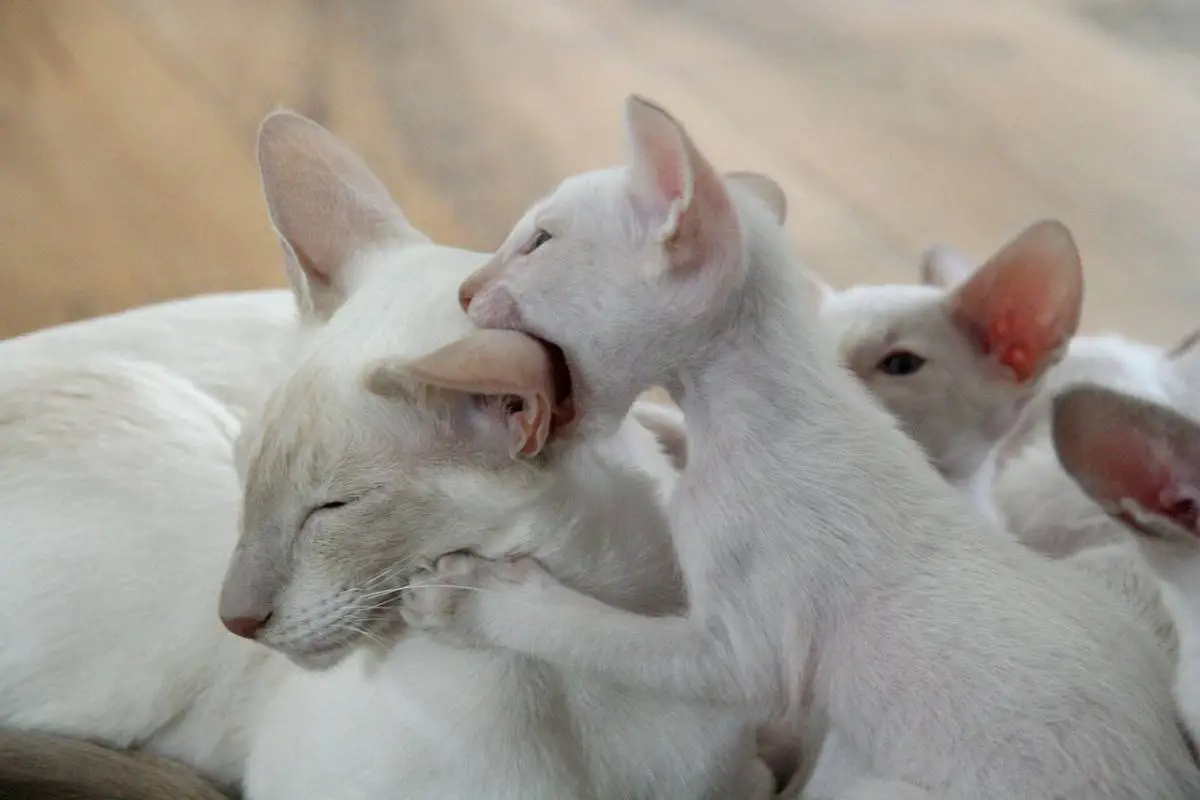When you pay attention to cats, you are going to learn a lot about feline behavior. What inspires them to behave the way they do? Well, in a German study, cats tend to react and respond to kitten meows. However, before we can go on to outline this study, let us look at some of the reasons why kittens meow.
Why do kittens meow?
We have previously discussed cat communication behavior. Cat’s meow to communicate their needs with us. Their different vocals will alert us when they need something. If you just adopted a kitty, then you must be keen to understand feline behavior and cat speak. So since kittens are unaware of our presence, why do they keep meowing?
Well, do not get me wrong as I understand that kitten meows are just the cutest. However, believe me, that she is probably trying to talk to her mother. Understand that cats are born a bit blind and also with ears sealed. For this reason, they will use vocalization to communicate with their mothers.
Kittens meow when they need something from their mothers. Below, we are going to discuss the instances in which kittens meow.

She is hungry
As we have mentioned above, kittens are born blind. It makes it impossible for her to keep following her mother around. Therefore, when she needs to feed, a newborn kitten will meow at her mother. Luckily, female cats do react faster to kitten meows.
Kittens are mostly quiet for the first few days unless they need something from their mother.
She is cold
Newborn kittens are in the habit of meowing when cold. Well, we can understand this because as they are born without proper eyesight, kittens also do not have a lot of furs. Therefore, if her mother won’t cuddle her through the night, then she could be cold.
While you may not be able to decipher why she is crying, the cat mother will. She will react and keep her litter warm.
She is trapped
As they grow older, cats want to discover the world. She will wander around the house and if allowed, outdoors. During these trips, she can get herself in a situation she is not able to get out of. For instance, she can get trapped in a laundry basket or when moving around.
If she cannot get out and feels trapped, then she will meow until someone gets her out. Again, the mother cat, of course, has a strong sense of hearing. She will try to help her offspring or even meow louder for you to help.
Isolation
Kittens, like human children, grow so fond of their mother. When they are separated, maybe she went on to explore on her own, the kitten will meow. It is probably something you have witnessed before, whereby a kitten loses her way to her mother.
She is going to find help the best way she knows, through crying and meowing hysterically.
Your kitten is scared
A kitten will also wail and meow when she is frightened. Unfortunately, cats are quite vulnerable to threatening situations. For instance, if your dog approaches her, even without posing a threat, she might meow in fear. Once again, it is the same way a child would wail if they got scared without their mother.
To trigger her mother’s response, the kitten will meow. As per feline caregiving behavior, the cat mother is going to react accordingly to protect her own.

Do cats react to kitten meows?
I am sure this might sound redundant to you as we have already determined that cats indeed react to kitten meows. However, just how accurate is this information? Do all cats react to kitten meows or just those with experience of raising kittens? Well, we are going to base this on facts, from a study by researchers from Hannover Medical School and University of Veterinary Medicine Hannover.
According to the author of the study Wiebke Konerding, female cats tend to respond more accurately. Why male cats do react to kitten meows, they do not care to decipher the emotional context in her vocalizations.
The study also suggests that female cats recognize the urgency in a kitten’s voice. Let us look at the research briefly as we explore cat behavior further.
The model of study
The study was directed at determining whether cats respond to the arousal in a kitten’s voice. They used 14 recorded calls from 7 kittens. 3 kittens were female and the other 4 males and they were all between 9-11 days of age.
For the first recording, a kitten was separated from her mother for three minutes. The researchers left her undisturbed while the second recording a kitten was picked from her nest box and placed on her back on the ground.
These recordings were then played to 17 adult cats between 1 and 8 years old, 9 male and 8 female cats. Half the number of female cats had never had any past experience raising kittens.
Female cats, as we mentioned earlier, tend to respond faster to kitten meows, even if she has never had kittens. It is genetic and quite special for the feline family. On the other hand, male cats responded 10% slower than the female cats. Also, female cats can detect emotional distress in the kittens’ voice. How amazing, right?
Also, they can recognize urgency from the way a kitten meows, unlike the male counterparts. Female cats adjust their responsiveness before they get to the kitten. This means that she will try to understand why the kitten is meowing in order to react accordingly.
Get this: the female cats react to kitten meows even though they have no past experience in raising young ones.
Why do cats react to kitten meows?
Now that we have discussed cat behavior in response to kitten meows, we need to know why they react. Well, is it part of caregiving behavior or does it happen naturally? Well, as we have outlined above cats react to kitten meows because they are concerned. Note that cats rarely communicate with each other through vocalization. Instead, they use body language and physical contact to communicate with one another.
However, a cat mother is able to understand what her litter needs. She can tell that a certain meow means that a cat is hungry or lost. Just as it is a mother’s nature to check on her child, a cat will also do the same. In fact, if her kitten has lost her way, she is going to stress about it. She might also start meowing in efforts to guide her young one to her.
Basically, we can conclude that cats react to kitten meows out of concern. Particularly, it has something to do with maternal instincts in female cats. On the other hand, male cats do react but definitely not out of urgency or the need to know why a kitten is meowing.
However, cats vary when it comes to personalities. Some kittens will be talkative throughout the day. On the other hand, others, such as the Persian cats will remain calm unless they need something. Well, try hanging out with a siamese cat and you are going to hear her chat the whole time.

Motherhood in felines
It is always a great feeling to have a child, and even to animals. If your cat has recently delivered her litter, then you must understand that things will change, just a little bit. Her litter comes first not and she is going to be even more territorial than ever before.
Cats, like all mammals, will protect her litter from any harm, even environmental factors. For instance, it is not strange to see your cat moving her kittens. She wants to keep them safe, warm and comfortable. This is one of the behavioral changes you will spot when your cat delivers.
She might not be as friendly as she used to. After all, she will spend most of her time checking and nursing her litter. Now, this is going to be interesting even for you. We have already identified that cats will react to cat meows. However, a mother cat is going to be extra sensitive and it could get ugly if you keep disturbing her.
For instance, if you keep visiting to check out the new cute faces in your home, she might get uncomfortable. And as a result, she might move the kittens from one place to another.
How do mother cats react towards her kitten meows?
Note that, as we mentioned above, kittens are born when a bit blind. She will be unable to start following her mother around. Even when she can see, she is going to depend on her mother’s instructions. When we say that cats do not communicate with each other through vocalization, this is an exemption. The mother cat will meow to communicate with her litter.
For instance, she will chirp or give a short meow when she approaches her litter. It is to tell them that she has not come home. She will also meow when she wants them to feed and sometimes they will talk back. This is where all cats learn how to vocalize, even feral cats.
The mother cat will also purr when she wants to comfort her kittens. Well, after they are all fed, she might start purring to put them to sleep. However, should your cat start yowling, as if she is in pain, all is not well. This could mean that she is sick. Consult your vet if your cat starts making uncertain cat sounds.
On the other hand, kittens also adopt the art of seeking attention from their mother. They might chirp or chatter to seek attention. It is going to be a beautiful experience for you to watch your cat nurse her young ones.
Conclusion
We have highlighted the most recent study about why cats react to kitten meows. Female cats tend to care more about why the kitten meows than male cats do. While a male cat will react to the meows, he may not care about the emotional context in the voice. Well, it does not have to be a female cat who has raised her litter. Rather, all-female cats do care about why a kitten is crying.
Well, following this study, you now understand why your cat might react if she hears kitten meow. They react even when you play a recording on your phone. You will need to study kitten-mother cat communication if your cat has recently delivered her litter.
[su_box title=”Affiliate Disclosure”]This website is supported by its readers. Please assume that all links are affiliate links. If you make a purchase from one of the links we will make a commission from Amazon. Thank you.[/su_box]




